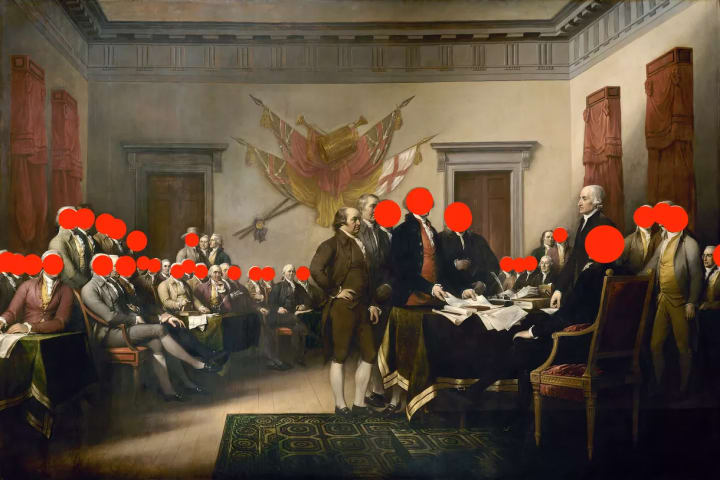
Dazed and Confused is a beloved cult film, especially among teenagers. I recall watching this film with my older brother during his later high school years. With the setting of the film, it seems like something of a coming of age film for teens. It was always one small scene that stood out to me that many probably take for granted. No judgment if you skip by this scene, thinking little or anything. Is the part necessary for the plot and enjoyment of the film? Of course not! I am speaking of Ms. Stroud's final words to her class...
“You know, the ’68 Democratic convention was probably the most bitchin’ time I ever had in my life. Hey guys, one more thing: This summer, when you’re being inundated by all the American bicentennial Fourth of July brouhaha, don’t forget what you’re celebrating, and that’s the fact that a bunch of slave-owning aristocratic white males didn’t want to pay their taxes.”
When I was much younger, I did not think much about this. Part of my reaction was 'what does she know?' Part of me also felt the same way when people begin to rant about Christmas. We get it, you hate consumerism, blah blah blah. You also have what she says about the 1968 Democratic Convention off-screen. If you do not know, the 1968 Democratic Convention was a period of violent protests in Chicago during the said convention. These young, liberal protesters were unhappy with Democratic candidate Hubert Humphrey and his loyalty to President Johnson's stance on the war in Vietnam. Hence, it's just some smug liberal bashing our founding fathers! At least this is another way to interpret her words. Let us give her the benefit of the doubt. Is Ms. Stround on to something?
Slave-Owning
The slave-owning founding fathers is not a new or an original point. The problem lies within the text of the document of the Declaration of Independence.
"We hold these truths to be self-evident, that all men are created equal, that they are endowed by their Creator with certain unalienable Rights, that among these are Life, Liberty and the pursuit of Happiness."
Yet, how can one sign this when one owns slaves? Thomas Jefferson owned hundreds of slaves! There exists a paragraph calling out the king and Britain for forcing slavery onto the colonies. However, the committee removes such text to appease Southerners. Now you have the example of the New Hampshire representative, William Whipple, who freed his one slave after signing. He felt it was hypocritical to sign such a declaration while holding someone in bondage. Nonetheless, this one example does not forgive the rest. Pamphlets and British Tories have their reactions. Both fire back, calling out the hypocrisy in the founders on freedom and slavery.

Americans know John Trumbull's famous 1818 oil painting of the Declaration of Independence. His piece is far from historically accurate, but that is not the point. Trumbull has 47 men in this painting, and 34 of them own slaves. Roughly three-fourths of the signers who celebrate natural rights own people in bondage. Again, this painting is far from historically accurate, but can it give you an idea. In truth, there are 56 signers, and 41 of them held slaves. With these numbers, I repeat, roughly three-fourths of our founders deny people their natural rights. After the war, there is no grand emancipation for slaves. Hence, abolition was never their goal at all. Freedom was only for rich, white men.
Tax Protesting
Taxation is a highly contested issue when it comes to America's call for independence. The tyranny of taxation usually stems from the American right in politics and education. Taxing citizens is a form of abuse, control, and power to them. Hence, they hammer away at Britain's tax policies on the colonists. Sadly, Ms. Stround falls for this. Did these aristocrats not want to pay their taxes? Actually, no.
Taxation of the colonists begins to pay for the debt incurred by defending them from the French and Indian from their war. Everyone knows war is costly, and other means to pay for the war debt will only lead to inflation. In fact, the Sugar Act was a tax cut on tariffs. However, the British are now truly enforcing this, hurting the business of many American smugglers. The Stamp Act is unpopular as all paper items receive a stamp, anything with this stamp is taxed. Imagine yourself as a lawyer or working in a newspaper. The tax on tea was more or less a bail-out for the British East Indian Company.
Yet, these mentioned taxes are all repealed. Truth is the colonists paid little in taxes in comparison to the Britons. Part of the problem stems from the form of taxation and the fact it is without any representation. British parliament continued to pass all kinds of new taxes afterward. Historical events are not the outgrowth of one problem, but several, and usually compounding. Ms. Stround and others forget this, instead of wanting to tell history in such a linear fashion of cause and effect.
What Are We Celebrating?
Celebrating the Fourth of July is somewhat strange. All that date represents is when the Declaration of Independence's wording is approved. After all the signatures, it is sent off to the printer for publication that day. Yes, independence is declared, but do the British recognize it? Not without war first. France recognized our independence, which is a start but hardly enough when it comes to international law and recognition. John Adams himself saw July 2nd as the real holiday, for that was the day the signers vote for independence.
America is hardly free or independent on the Fourth of July, but only starting its path towards that goal. Plus, the revolution changes little, besides removing parliament and a monarchy. Wealthy, white men still retain power, if not all the power. Do things change for women? Are African-Americans given freedom? Remember, voting rights, in the beginning, are only bestowed upon wealthy, property-owning white men.
Keep in mind this film takes place in 1976, as she notes, this is the country's bicentennial. During Watergate a woman notes the country is near its 200th birthday and wants to be proud of her country, but simply is not. The seventies is rife with Watergate, The Pentagon Papers, Vietnam and its loss, a rise in crime, and the birth of sociopaths like Charles Manson. Americans are a bit 'dazed and confused' after all of this. We thought our government was honest. We were use to the innocence of prior decades. Our economy was tanking! Sorry Ms. Stroud but Americans need some brouhaha and a drink. With our knowledge of history now, some Americans may even argue they need a drink at this time, given Carter is on the way in 1976.
Sources
Armitage, David The Declaration of Independence: A Global History
Green, John, Crash Course - U.S. History, YouTube
About the Creator
Skyler
Full-time worker, history student and an avid comic book nerd.






Comments
There are no comments for this story
Be the first to respond and start the conversation.